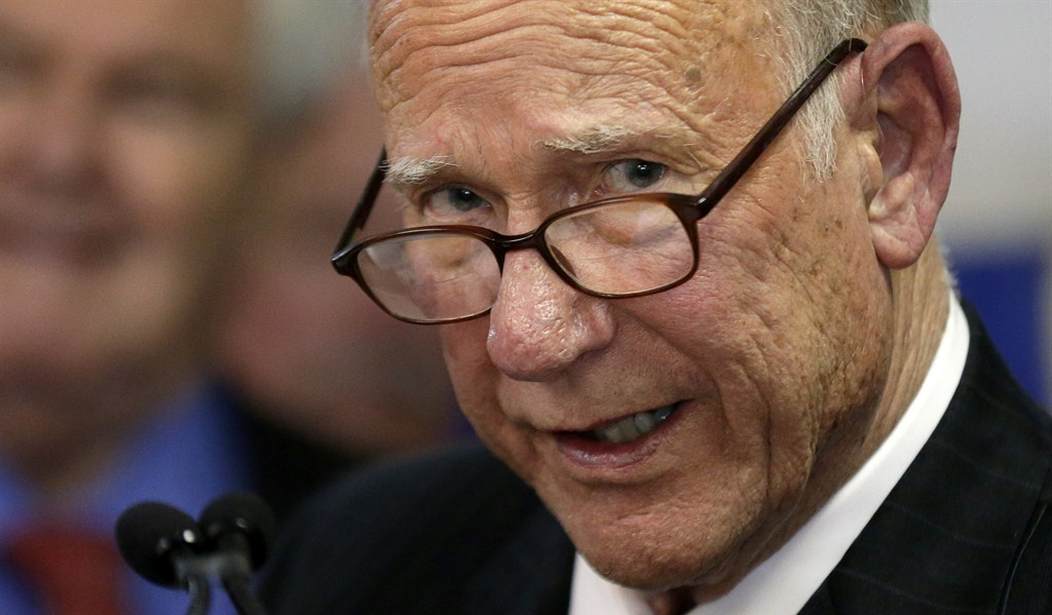I see more turbulence and undercurrents among Republican primary voters than usual. The evidence is that incumbents -- both those the mainstream media call tea partyers and those they call the party establishment -- have been prevailing by tenuous margins in primaries that in the pre-tea party years would almost certainly not have been seriously contested.
Take Kansas. There Sen. Pat Roberts was renominated over challenger Dr. Milton Wolf by just a 48 percent to 40 percent margin -- a victory, but an embarrassingly low margin for someone who has been in Congress for 34 years.
Wolf, a second cousin of President Obama, made much of the fact that Roberts maintains only a nominal residence in the state. But the doctor was hurt when it was revealed that he circulated X-rays of wounded patients with macabre comments.
Roberts, perhaps awakened by the near-defeat of fellow septuagenarian and longtime incumbent Thad Cochran in Mississippi, worked hard in affluent Johnson County, just outside Kansas City, which casts one-fifth of the primary vote. He held Wolf to a 107-vote margin there and carried 92 of the other 104 counties.
Also renominated was Gov. Sam Brownback, by 63 percent to 37 percent. Brownback's push for tax cuts has been controversial; critics charge it hasn't stimulated growth and has forced the state to cut needed spending. Some 100 current and past Republicans officials signed a letter supporting his Democratic opponent.
Recommended
This is the latest chapter in a long-simmering intra-party fight between conservatives and moderates. Brownback prevailed, but by a margin that suggests problems in November.
Kansas also saw serious challenges of incumbents in two of its four congressional districts. In the 1st District, Tim Huelskamp, a frequent rebel against the House Republican leadership, won, but by only 54 percent to 46 percent.
There was a clearer verdict in the Wichita-centered 4th District, where incumbent Mike Pompeo led his predecessor, Tom Tiahrt, by 63 percent to 37 percent.
Tiahrt ran as a champion of earmarks, arguing they were necessary to help Wichita's troubled private plane industry. Pompeo pledged no earmarks, and various conservative groups supported each candidate.
The lesson from these results: Many Republicans are skittish about backbench rebellions that produced the government shutdown and hurt the party in the polls; many more are pleased to see earmarks go, even when they arguably help the local community.
Michigan had significant Republican primaries in six congressional districts. House Energy and Commerce Chairman Fred Upton, who has faced conservative challenges before, won with 71 percent in the 6th District.
In the 4th District, John Molenaar, endorsed by incumbent retiring Ways and Means Committee Chairman Dave Camp, beat self-funding businessman Paul Mitchell by 52 percent to 36 percent. In the 8th District vacated by House Intelligence Committee Chairman Mike Rogers, moderate Mike Bishop beat tea-party-identified Tom McMillin, 60 percent to 40 percent.
You could chalk these up as establishment victories. But don't count business-supported Dave Trott's 66 percent to 34 percent pounding of incumbent reindeer farmer and Santa Claus impersonator Kerry Bentivolio in the 11th District. He was a fluke winner two years ago and didn't put up much of a fight this time. And conservative incumbents in the 1st and 7th districts won with 70 percent of the vote or more.
In the Grand Rapids 3rd District, local and national business groups spent big money on challenger Brian Ellis. But he failed to oust incumbent Justin Amash, who makes a practice of tweeting his reasons for his votes, often against the party leadership, on every roll call.
On foreign policy, Amash takes a stand much like Sen. Rand Paul's, and he recently voted against funding Israel's Iron Dome missile defense system. He won by 57 percent to 43 percent, a decisive margin but no landslide for an incumbent in a primary -- and he characteristically refused to take his opponent's congratulatory phone call.
Republican primary turnout continues to be more robust than Democratic turnout, a good omen for the party in November. And Republican primary voters seem reluctant to vote for firebrands who lose general elections or provoke government shutdowns.
But they are also more open to questioning incumbents. It's as if they are seeking a way forward to policies with voter appeal, with no clear idea of how to get there.

























Join the conversation as a VIP Member